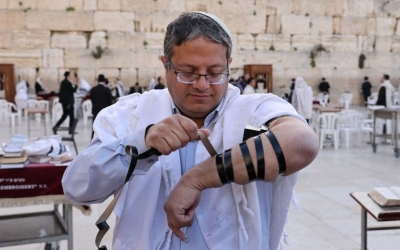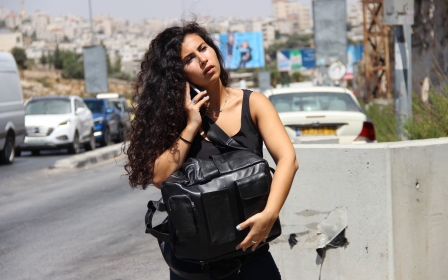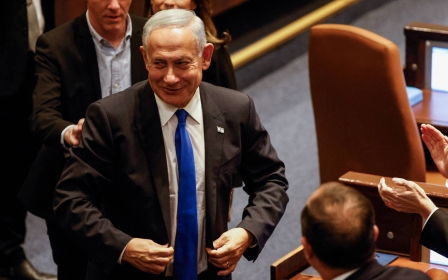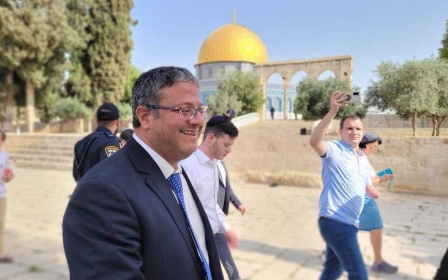UN Security Council members 'concerned' after Israel's Ben-Gvir storms Al-Aqsa
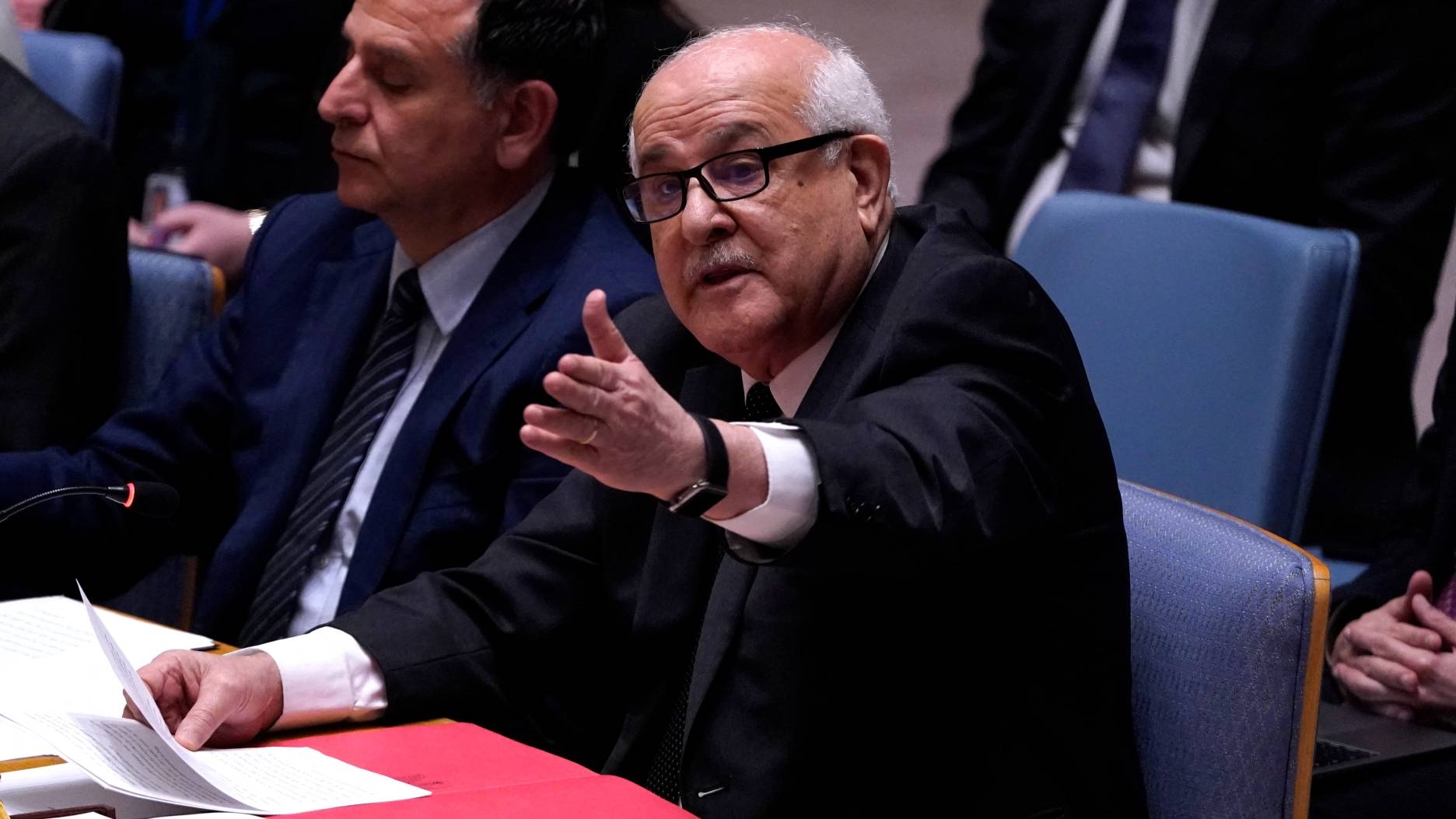
Members of the UN Security Council held an emergency meeting about Al-Aqsa mosque on Thursday evening to warn of an escalation following the storming of the site by a far-right Israeli minister.
Itamar Ben-Gvir, Israel's national security minister and leader of the Otzma Yehudit party, entered Al-Aqsa Mosque with a heavy security escort on Tuesday vowing to shatter the status quo at the site.
Currently, only Muslims are officially allowed to pray at Al-Aqsa, while followers of other faiths, including Christians and Jews, can visit as tourists but have to pay.
'The US firmly supports the preservation of the historical status quo with respect to the holy sites in Jerusalem'
- Robert Wood, US ambassador to the UN
However violations of the status quo are increasing, with Israeli religious activists frequently entering the Al-Aqsa complex, and security forces detaining Muslim worshippers, and obstructing the work of the Islamic Waqf which has jurisdiction over the holy site.
Robert Wood, the US ambassador to the UN, said that Washington is concerned about tensions rising between Palestinians and Israelis after Ben-Gvir's visit.
New MEE newsletter: Jerusalem Dispatch
Sign up to get the latest insights and analysis on Israel-Palestine, alongside Turkey Unpacked and other MEE newsletters
"[The US is] concerned by any unilateral acts that exacerbate tensions or undermine the viability of a two-state solution," Wood told the Security Council.
"The US firmly supports the preservation of the historical status quo with respect to the holy sites in Jerusalem, especially on the Haram al-Sharif," he added.
For years, the US has used its veto to shield Israel from any Security Council resolution that condemns it. Russia, China, France, and Britain also have UN veto powers.
Wood said that the US administration expects Israel to preserve the status quo at Al-Aqsa.
"In this spirit, we oppose any and all unilateral actions that depart from the historical status quo that are unacceptable," he said.
'Al-Haram al-Sharif will not fall'
China and the United Arab Emirates called the meeting after the State of Palestine, which became a UN non-member observer in 2012, and the Hashemite Kingdom of Jordan requested it.
The meeting was summoned without issuing a resolution or an official statement.
Speaking about Al-Aqsa mosque, Riyad Mansour, the Palestinian envoy to the UN, said: "Al-Haram al-Sharif will not fall."
"It will stand for generations to come. It has outlasted Begin, Shamir and Sharon and will outlast Netanyahu, Ben-Gvir and Erdan," referring to former and current Israeli prime ministers and right-wing leaders.
'What red line does Israel need to cross for the Security Council to finally say, enough is enough?'
- Riyad Mansour, Palestine's envoy to the UN
Mansour confirmed that Israel remains an occupying power in East Jerusalem and the West Bank - areas it captured in the 1967 war - and that, as such it had no claim or right to sovereignty over al-Aqsa.
He also asked the UN members: "What red line does Israel need to cross for the Security Council to finally say, enough is enough?
"There is no peace without Jerusalem. The future of conflict and peace in our region will be determined in Jerusalem, not any other capital around the world. Anybody who says otherwise is either delusional or lying," Mansour said.
Gilad Erdan, the Israeli envoy to the UN, told media before the meeting that, "Jews are permitted to visit the holiest site in Judaism. It is the right of every Jew, every Jew. Israel has not harmed the status quo and has no plans to do so."
Erdan refused to answer a question about whether he supports the establishment of a Palestinian state or not, and he denounced the Security Council meeting as "ridiculous, pathetic, and unnecessary”.
Erdan stormed Al-Aqsa when he served as national security minister (2015-2020). Ben-Gvir now holds this same position, putting him in charge of the police.
Ben-Gvir's inflammatory visit
Mansour told the Security Council that "the historic and legal status quo, the rights of the Palestinian people and the sovereignty of the State of Palestine must be upheld."
Responding to Ben-Gvir's incursion at al-Aqsa, Mohamed Khaled Khiari, UN assistant secretary general for the Middle East, Asia and the Pacific, said that "while the visit was not accompanied or followed by violence, it is seen as particularly inflammatory, given Mr Ben-Gvir's past advocacy for changes to the status quo."
Mohamed Abushahab, the UAE's ambassador to the UN, said Ben-Gvir's visit "constitutes a serious development that moves the region further away from the desired path of peace and contributes to perpetuating the negative trends of the conflict."
The UAE signed a normalisation deal with Israel in 2020. The Emirati foreign ministry had condemned Ben-Gvir's visit.
Two-state solution
Barbara Woodward, the UK ambassador to the UN, said that Britain "recognises and values Jordan's important role as custodian of the holy sites and urges the importance of cooperation with the Jordanian authorities in this regard.
"The UK is committed to working with all parties to uphold this status quo in Jerusalem. All parties must avoid actions which inflame tensions, undermine the cause of peace, or unilaterally seek to alter the status quo," Woodward said.
She reiterated the UK's "support for a two-state solution, based on 1967 lines and Jerusalem as the shared capital, as the only way to ensure a lasting peace between the parties".
Israel occupied East Jerusalem during the 1967 Middle East war. It annexed the entire city in 1980, in a move unrecognised by the majority of the international community.
The Old City of Jerusalem and Al-Aqsa complex remain the most sensitive components of the Israeli-Palestinian conflict.
The director of the Waqf in Jerusalem, Sheikh Azzam al-Khatib, told Middle East Eye's Peter Oborne recently that violations of the status quo are now routine. "Israeli security forces are all over Al-Aqsa and all over the courtyard. They can prevent anyone they want from entering. They detain Muslims. They have stopped more than 20 major projects."
Israeli far-right activists have repeatedly pushed for an increased Jewish presence at al-Aqsa, despite a longstanding joint agreement between Israel and Jordan.
Middle East Eye delivers independent and unrivalled coverage and analysis of the Middle East, North Africa and beyond. To learn more about republishing this content and the associated fees, please fill out this form. More about MEE can be found here.


